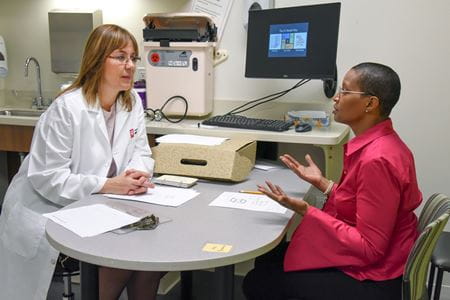At Indiana University School of Medicine, the 2020 fiscal year set another record for NIH-funded research, with the school’s faculty attracting federal support for research about Alzheimer’s disease, genomic-guided therapies, cancer research and more. Here are the projects that were awarded the largest grants:
1. Longitudinal Early-Onset Alzheimer’s Disease Study, led by Liana Apostolova, MD, MSc, FAAN – $15,954,813
This is a two-year observational study designed to look at disease progression in adults with early-onset Alzheimer’s disease (between ages 40-64). Researchers are also recruiting cognitively normal volunteers for a one-year comparison.
2. Indiana University / Jackson Laboratory Model Organism Development & Evaluation for Late-Onset Alzheimer’s Disease, led by Bruce Lamb, PhD – $8,171,665
This consortium is working to develop the next generation of in vivo Alzheimer’s disease models based on human data for researchers across the country.
3. Target Enablement to Accelerate Therapy Development for Alzheimer’s Disease, led by Alan Palkowitz, PhD – $7,700,751
Researchers at this center are working to improve, diversify and reinvigorate the Alzheimer’s disease drug development pipeline.
4. Indiana Clinical and Translational Sciences Institute, led by Sharon Moe, MD – $7,134,199
This institute works to accelerate research, grow talent and improve health by bringing together Indiana’s brightest minds to solve the state’s most pressing health challenges.
5. National Cell Repository for Alzheimer’s Disease, led by Tatiana Foroud, PhD – $5,205,087
This is a program where researchers store and provide biological materials (like DNA, plasma and brain tissue) which enable Alzheimer’s disease research locally and nationwide.
6. International epidemiology Databases to Evaluate AIDS, led by Kara Kay Wools-Kaloustian, MD – $3,976,050
This international research consortium works to collect, consolidate and analyze data about treatment of HIV and evaluates outcomes of people living with HIV/AIDS.
7. Indiana University Simon Cancer Center, led by Pat Loehrer, MD – $3,443,264
This grant supports basic and translational research being done at the IU Simon Cancer Center.
8. Deciphering the role of CX3CR1 in Modulating Mechanisms of Amyloid driven Neurodegeneration in Alzheimer's Disease, led by Bruce Lamb, PhD – $3,087,997
This study focuses on how microglia—the brain’s immune cells—contribute to neurodegeneration, using a well-established animal model of Alzheimer’s disease.
9. Implementing Genomics in Practice, led by Todd Skaar, PhD – $2,593,224
The goals of this project are to recruit minority and underserved patients and test effects of genotype-guided opioid therapy on pain control and opioid-related adverse events.
10. Indiana Alzheimer’s Disease Center, led by Andrew Saykin, PSYD – $2,499,347
This is one of 32 Alzheimer’s disease research centers that are national hubs for clinical trials and patient support programs.
